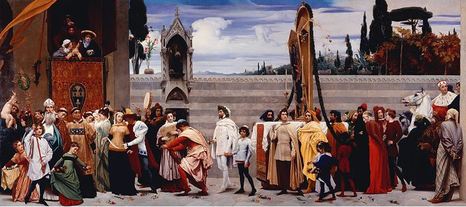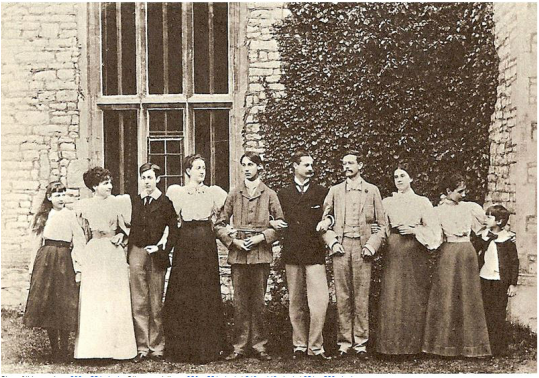My favorite – it is one of six sites that appear as my home page – is Anecdotal Evidence. Patrick Kurp posts an essay on writers and writing, well-written and well-argued – every day. How does he do it? Does he carve out a block of time in the busy week of a university professor (no irony; academics are the most harried and under pressure of all professionals – for the twenty weeks a year that they teach, anyway) to sit down and write seven or eight at once? Maybe he writes them all during vacations, then tweaks them up-to-date before posting them on a daily basis. If Kurp really does manage every day, 365 days a year, to find an hour – an hour, at least – in which he can get his head together enough to produce 500 well-reasoned, intelligent, sensitive words on an interesting literary subject then, like Samuel Johnson, he too is an interesting literary character.
I just don’t get Samuel Johnson. Granted, Johnson is more than just an interesting literary character, he is a cultural artifact. But one of our language’s great writers? His masterpiece, A Dictionary of the English Language, is an exercise of wit within a rigorous, scientific order, which makes it a paradigm of 18th century writing. Otherwise, Johnson, the writer, does not meet the high standards of his friends, Burke, Goldsmith or Gibbon or, for that matter, James Boswell.
Rasselas, a work of fiction that today’s Wikipedia anachronistically refers to as a “novella,” evidently was widely read, and lived on for about a century as a point of reference in literary conversations, real and fictional. Whatever glow it had for Austen, the Brontës, George Eliot, Hawthorne, et. al., has faded. The History of Rasselas, Prince of Abissinia, is a bildungsroman, so it is sometimes thought of as a sort of conservative answer to Candide. Instead, it is an orientalist Pilgrim’s Progress, but not as much fun to read as Bunyan.
“What reason,” said the prince, “can be given, why the Egyptians should thus expensively preserve those carcasses which some nations consume with fire, others lay to mingle with the earth, and all agree to remove from their sight, as soon as decent rites can be performed?”
“The original of ancient customs, said Imlac, “is commonly unknown; for the practice often continues when the cause has ceased; and concerning superstitious ceremonies it is vain to conjecture; for what reason did not dictate reason cannot explain.
Then there is what we might call Johnson's blog, The Rambler. From today’s Wikipedia:
The Rambler was written primarily for the newfound, rising middle-class of the 18th century, who sought social fluency within aristocratic social circles. It was especially targeted to the middle-class audience that were increasingly marrying into aristocratic families in order to create socio-economic alliances, but did not possess the social and intellectual tools to integrate into those higher social circles which required great understanding of [such] subjects [as] morality, literature, society, politics, and religion.
(Now, that is good writing -- except for the use of the preposition "to" instead of "at" with "targeted," which identifies the author as 21st century British, with the English habit, or English disease, of falling back on "to" whenever what the correct preposition is takes a wee bit of thought.)
The Rambler has none of the quotidian verve and humor of The Spectator and The Tatler of a generation earlier, with which it often is compared. The Rambler is ponderous; there’s no kinder way to put it. The Rambler, on fiction:
These books are written chiefly to the young, the ignorant, and the idle, to whom they serve as lectures of conduct, and introductions into life. They are the entertainment of minds unfurnished with ideas, and therefore easily susceptible of impressions; not fixed by principles, and therefore easily following the current of fancy; not informed by experience, and consequently open to every false suggestion and partial account.
That the highest degree of reverence should be paid to youth, and that nothing indecent should be suffered to approach their eyes or ears; are precepts extorted by sense and virtue from an ancient writer, by no means eminent for chastity of thought. The same kind, tho' not the same degree of caution, is required in every thing which is laid before them, to secure them from unjust prejudices, perverse opinions, and incongruous combinations of images.
The first sentence above, on its lonesome, might be quoted as a typical Johnson quip – funny, opinionated and cantankerous. But it is drowned in the lugubrious posturing that follows it.
I can enjoy a long, complicated, even convoluted sentence as much as the next guy – no, much, much more than the next guy, but – how can I put it? – Johnson has no sense of rhythm, no cadence. If you’re going to use a lot of Latinate words, they must, if not sing, then at least march in step.
From Gibbon – a completely random selection:
After the senate had conferred on Maximus and Balbinus an equal portion of the consular and tribunitian powers, the title of Fathers of their country, and the joint office of Supreme Pontiff, they ascended to the Capitol to return thanks to the gods, protectors of Rome.
The reading mind enjoys Gibbon, as well as understands him. The long-winded, pedantic style of The Rambler may reach the understanding, but there is not much pleasure attached. Odd, since Johnson was known for his conversation.
Boswell’s engaging, garrulous, and witty Johnson can be found in the hundred pieces he wrote for The Idler. A few are in the form of letters from “correspondents.” The Idler of March 10, 1759, begins:
Mr. Idler,
I am the unfortunate wife of a city wit, and cannot but think that my case may deserve equal compassion with any of those which have been represented in your paper.
Two choice paragraphs from the letter, purportedly from a “Deborah Ginger”:
I would gladly, Mr. Idler, be informed what to think of a shopkeeper, who is incessantly talking about liberty; a word, which, since his acquaintance with polite life, my husband has always in his mouth: he is, on all occasions, afraid of our liberty, and declares his resolution to hazard all for liberty. What can the man mean? I am sure he has liberty enough; it were better for him and me if his liberty was
lessened.
He has a friend, whom he calls a critick, that comes twice a week to read what he is writing. This critick tells him that his piece is a little irregular, but that some detached scenes will shine prodigiously, and that in the character of Bombulus he is wonderfully great. My scribbler then squeezes his hand, calls him the best of friends, thanks
him for his sincerity, and tells him that he hates to be flattered. I have reason to believe that he seldom parts with his dear friend without lending him two guineas, and am afraid that he gave bail for him three days ago.
This is good stuff, as are The Journey to the Western Isles of Scotland, Life of Richard Savage, and Johnson's prefaces to Shakespeare (for the insight they give us that Shakespeare’s universality is a shape-shifter, if for nothing else), but none of them meet the standard for great writing called for by Johnson’s tremendous reputation.
As for Johnson’s poetry: perhaps the less said, the better. Nevertheless. In London, he attempts to write like Pope:
Though grief and fondness in my breast rebel,
When injured Thales bids the town farewell,
Yet still my calmer thoughts his choice commend,
I praise the hermit, but regret the friend,
He occasionally almost succeeds, as with
Farewell! — When youth, and health, and fortune spent,
Thou fly'st for refuge to the wilds of Kent;
His play, Irene, deals with an incident in the life of Muhammad, who says things like,
Robb'd of the maid, with whom I wish'd to triumph,
No more I burn for fame or for dominion;
Success and conquest now are empty sounds,
Remorse and anguish seize on all my breast;
Those groves, whose shades embower'd the dear Irene,
Heard her last cries, and fann'd her dying beauties,
Shall hide me from the tasteless world for ever.
As deserving of a fatwah (on literary grounds, alone) as a Salman Rushdie novel. As a whole, Irene resembles, more than anything else, the side-by-side English translation in a CD booklet of the stilted libretto of an opera by Lully or Rameau.
Johnson’s outsized reputation is based on Boswell’s account of his conversation and his depiction of Johnson’s personality. Why, when we quote Johnson, do we not credit Boswell the same way that, when we quote Socrates, we credit Plato?
Like Plato, Boswell did not invent the individual he idolized. We can find Boswell’s Johnson in the Dictionary, in The Idler, and in passages in the Lives of the Poets, such as this, from his Life of Cowley:
The metaphysical poets were men of learning, and, to show their learning was their whole endeavour; but, unluckily resolving to show it in rhyme, instead of writing poetry, they only wrote verses, and, very often, such verses as stood the trial of the finger better than of the ear; for the modulation was so imperfect, that they were only found to be verses by counting the syllables.
Johnson at his best: trenchant, amusing, wrong.
For all his wit, without Boswell, Johnson, the writer, primarily would be known as a pioneering lexicographer. On the other hand, without Boswell, Johnson, the man, instead of being seen as England’s most beloved eccentric, might be regarded as a thinker engaged with his times, and placed beside Edmund Burke as a commanding English figure of the counter-enlightenment.



 RSS Feed
RSS Feed